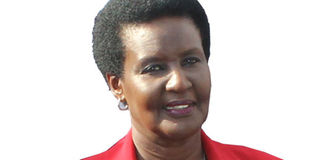World Trade Organisation must serve Uganda’s needs

Amelia anne Kyambadde
The 11th World Trade Organisation (WTO) Ministerial Conference is yet another opportunity for us to build a stronger Multilateral Trade System that serves the needs of all its members, especially the Least Developed Countries (LDCs).
The founding principles of the WTO are designed to ensure that developing countries, especially the least developed among them, secure a share in the growth in international trade commensurate with the needs of their respective economic development.
According to the Sustainable Development Goal 17:10, we committed to rules based, non-discriminatory and equitable multilateral trading system under the WTO, including the conclusion of negotiations under its Doha Development Agenda.
The 2016 UNIDO Report on Industrialisation in Africa LDCs: Africa’s Manufactured Value Added (MVA) accounted for just 1.6 per cent of the global total in 2014.
The exports of primary commodities accounted for nearly 80 per cent in comparison to about 20 per cent for manufactured goods.
We are undertaking structural reforms towards industrialisation such as infrastructure development - in affordable energy, roads, rail and ICT; policy and regulatory framework; skills development and gender mainstreaming.
The SDG No 17:11 focuses on increasing the exports of developing countries, with a view to doubling the least developed countries’ share of global exports by 2020.
Have we achieved our goals and aspirations under the WTO? We must admit that we have registered minimal progress in the implementation of our decisions, which further calls for reformulation of Trade Policy instruments to facilitate structural transformation, industrialisation and value addition, promotion of employment and increasing of household incomes.
It is with the above aspirations that we support the G90 submission, which is in line with Agenda 2063 - “The Africa We Want”.
Our vision as government is to graduate Uganda into a middle-income country by 2020 and the national programmes I have alluded to above, are meant to fulfil these aspirations. The multilateral trade rules, therefore, have to complement rather than constrain that endeavour.
Agriculture: Uganda is predominantly an agricultural country with a population of 40 million people, of which 70 per cent depend on agriculture for subsistence and livelihood purposes. Therefore, 80 per cent of our export earnings are derived from the agricultural sector.
It is, therefore, important that we implement: The requisite reforms envisaged in Para 13 of the Doha Ministerial Declaration with the view to the substantial reductions of domestic support; Hong Kong Ministerial Declaration on an outcome on cotton in line with the C4 proposal; the Bali and Nairobi Ministerial decisions on a Permanent Solution on Public Stock Holding for Food Security Purposes, which should include future programmes for LDCs; and the establishment of an effective and easy to use Special Safe Guard Mechanism.
Trade in Services: On disciplining domestic regulation and governance, Uganda reserves the right to regulate for legitimate objectives as enshrined in the WTO General Agreement of Trade in Services. As we nurture the growth of our services sector, targeted technical and capacity building be extended to the private sector in order for them take advantage of the benefits in the international services trade.
We are all aware that the Doha Round is meant to address the development needs and interests of developing countries. In this regard, we concluded the Trade Facilitation Agreement as a direct product of the Doha Work Programme.
However, many areas of the DDA remain outstanding, including the reform envisaged in agriculture, cotton, special and differential treatment and other LDC specific issues.
It is only rational that we conclude the Doha round before the introduction of new issues in the WTO negotiations.
The conclusion of the Doha Round is, therefore, a key objective for Uganda.
Implementation of decisions: As we adopt decisions, it will be plausible to set implementable targets within a determined time frame in order for us to achieve tangible outcomes of our deliberations.It is our earnest prayer that we comply with the September 2015 decision of the Heads of State and Government on the conclusion of the Doha Round in Goal 17.10 of the SDGs.
This is Ms Kyambadde, the Minister of Trade Industry and Cooperatives statement during the eleventh WTO ministerial Conference in Argentina that took place from December 10-13.
Mr Daniel Kalinaki’s column returns in January




